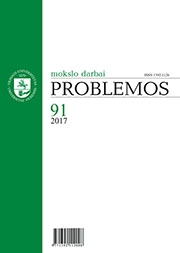VERTYBIŲ IR VERTINIMO PROBLEMA HEIDEGGERIO FILOSOFIJOJE
HEIDEGGER’S PHILOSOPHY OF VALUES AND VALUING
Author(s): Dalius JonkusSubject(s): Ethics / Practical Philosophy, Contemporary Philosophy, German Idealism, Existentialism, Phenomenology, Ontology
Published by: Vilniaus Universiteto Leidykla
Keywords: axiology; value; affordances; Neo-Kantian philosophy; Heidegger;
Summary/Abstract: The article analyses the concept of value and valuing in Heidegger’s philosophy. The article aims to show that Heidegger’s criticism of value does not deny the possibility of axiology in his philosophy. Heidegger criticizes the Neo-Kantian concept of value, because he aims to distance himself from the objectivist and subjectivist philosophy of value. Heidegger understood value not as a transcendence of the world, but as the meaning of the life-world. Heidegger drew from Husserl’s and Emile Lask’s ideas about the intentional relationship between the shape of the object and its perception. This is the correlation between the meaning of the object and the action oriented to it, which Heidegger interprets as the affordance of the tool. The article reveals that value is a correlative structure of the pragmatic world and the subject acting within it. Firstly, the article provides an overview of Heidegger’s polemic with Neo-Kantian theory of value, secondly, it examines the concept of affordances in Being and Time and Heidegger’s lectures Introduction to Philosophy.
Journal: Problemos
- Issue Year: 2017
- Issue No: 91
- Page Range: 87-98
- Page Count: 12
- Language: Lithuanian

